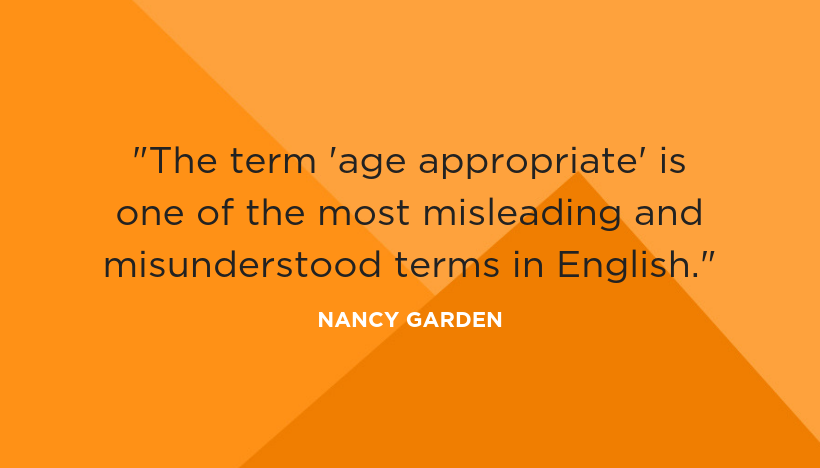Often, when a text is challenged, the challenger states that the text is “inappropriate” for students of that age/grade. What the challenger usually means by “inappropriate” is that she doesn’t want her student to encounter certain scenes or ideas in the text because she fears the student is not old enough or ready enough for them.
Vicky Greenbaum notes in a February 1997 English Journal article:
“Many adults seem convinced of a type of innocence in youth, making them unready to face the sight of death, sex, or evil (which three forces may, according to such a vision, be inextricably linked).
“This vision of innocence persists despite the prevalence of violence on television, in the movies, and in various other highly visible cultural manifestations, along with reallife traumas such as child abuse. In fact, adolescents tend to know far more than wishful thinking surmises. Adults who cling to this vision of youth have a corresponding vision of what’s appropriate, hoping perhaps that if youth are unexposed to certain elements in the world, they will remain pure, and the world will be a better place. Indeed, for such adults a pristine vision of youth often forms a wall between themselves and any adolescents they happen to know.”
She goes on to say,
“Youth are people already, possessing knowledge and vulnerabilities in ways akin to adults, and their greatest need may be for thoughtful consideration or guidance while making sense of a vast, difficult, not always appropriate world.”
And, we at NCTE agree!
Young adult and children’s author Nancy Garden notes in “The Moral of the Story: Young Adult Authors Speak on Morality, Obligation, and Age Appropriateness,”
“The term “age appropriate” is one of the most misleading and misunderstood terms in English. On its face, it seems reasonable and useful—but the fact is that what is “appropriate” information for one eight-year-old—or eleven-year-old preteen—or sixteen-year-old young adult—varies hugely depending on the individual kid’s maturity, background, education, and experience.”
Vicky Greenbaum adds,
“Current common usage of the term appropriate is derived from the concept of “age-appropriate” behaviors investigated by psychologists, beginning with Jean Piaget…Appropriateness,” while suitable when used to describe behavior, may not accurately describe literature…[and]…recent research refutes the notion that there exist specifically “age-appropriate” concepts or reading material within a curriculum.”
Members of the NCTE Standing Committee Against Censorship agree, and they have been collecting information on pedogogical “appropriateness” in literature—in particular, they’re looking to describe how the texts teachers select to use in their classes are pedagogically appropriate for the curriculum.
If you know of any articles or research on this topic, please send them or their citations along via comments to this blog.


